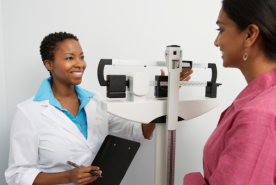August 12, 2014
 Overlooked, overworked and misunderstood. What part of the body meets this description? The kidneys!
Overlooked, overworked and misunderstood. What part of the body meets this description? The kidneys!
––They work hard. They are on call morning, noon and night to filter toxins from your body and regulate fluids and blood pressure.
––Kidneys are overlooked. Most people don’t know where they are. (Kidneys are located near the back of your body near the waist.)
––The kidneys’ importance is not always understood. In fact, most people don’t know what kidneys do or the risk factors for kidney disease.
Dr. Leslie Spry, National Kidney Foundation spokesperson, wants you to know about kidney myths. Dr. Spry set the record straight on some common kidney–related misconceptions.
- I have back pain so it must be my kidneys. Pain in the back may come from kidney disease if you have infection or blockage of the kidneys. Other forms of kidney disease rarely cause pain in the back. The most common cause of back pain is disease of the muscles or spine and not kidney disease. The kidney can only feel pain if the covering of the kidney (called the capsule) is stretched. This means swelling of the kidney from either infection or blockage of urine flow (such as a kidney stone) will result in pain that typically radiates from the flank and may come around the side to cause pain down into the groin area.
- I don’t have any trouble passing my urine so my kidneys must be fine. Even patients who are on dialysis make urine. Damaged kidneys will continue to make urine even if they no longer properly clean your blood. Kidney disease can be completely without symptoms. The only way you can tell if you have kidney disease is to have blood and urine testing as recommended by the National Kidney Foundation.
- As I age, it is normal for my blood pressure to be higher. While it is true that blood pressure gradually increases with age, many elderly patients still have a normal blood pressure. Normal blood pressure is still 120/80 at any age and if your blood pressure is elevated, you should be evaluated by your physician. Studies have continued to show a benefit of treating even very elderly patients for high blood pressure. High blood pressure is the second most common cause of kidney disease and is the most common cause of kidney disease in the elderly.
- I can feel when my blood sugar is high, so I treat it on the basis of how I feel. Unfortunately, the longer you have diabetes the less likely this is true. Diabetes is the most common cause of kidney disease and patients with chronic kidney disease develop two complications related to diabetes. They are less likely to notice changes in blood sugar the way they used to. This is because diabetes gradually injures the body nerves in exactly the same way as it does the kidney. Hence your ability to “feel” your blood sugar is lost as one develops progressive kidney disease. Second, the kidney helps to break down insulin in the body. As kidney function is lost, insulin tends to last longer in the body. Loss of kidney function can result in very low blood sugars for prolonged periods of time as the insulin lasts longer and longer in the body.
- If my blood pressure becomes normal with treatment, I can stop taking my blood pressure pills. Patients with kidney disease need to maintain a normal blood pressure and the use of specific blood pressure agents (one of two drug groups known as ACE–inhibitors and ARB agents) help to protect the kidney against damage. So, in addition to maintaining control of the blood pressure, these agents are kidney–protective and should be taken as prescribed by your doctor.
These are not myths about kidney disease:
- Diabetes, hypertension and age 60 or greater are the most common reasons for low kidney function.
- Heart disease, family history of chronic kidney disease and being of an ethnic and/or racial minority group are important predictors of risk.
- CKD is more common among women than men.
- More than 35 percent of people aged 20 years or older with diabetes have CKD.
- More than 20 percent of people aged 20 years or older with hypertension have CKD.
- Chronic kidney disease is one of the world’s most important public health problems.
- Chronic kidney disease can often be prevented.








